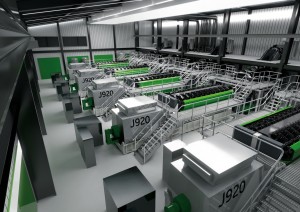x
- More +
GE’s Latest Gas Engine Technology Delivered to E.ON Hanse Wärme’s Largest CHP Plant – Aug 01, 2014– Stapelfeld, Germany (Techreleased) – GE’s Distributed Power business announced the delivery of its first Jenbacher J920 gas engine project to E.ON Hanse Wärme GmbH’s Stapelfeld plant, which will be its largest combined heat and power (CHP) plant using […]
BY Editor
Posted On August 1, 2014
GE’s Latest Gas Engine Technology Delivered to E.ON Hanse Wärme’s Largest CHP Plant – Aug 01, 2014– Stapelfeld, Germany (Techreleased) – GE’s Distributed Power business announced the delivery of its first Jenbacher J920 gas engine project to E.ON Hanse Wärme GmbH’s Stapelfeld plant, which will be its largest combined heat and power (CHP) plant using a gas engine. E.ON Hanse Wärme is investing around €6.8 million in the plant, which, once completed, will generate enough electricity to supply more than 21,500 households east of Hamburg. This week, the CHP plant’s most important components, the J920’s engine block and generator, are being delivered.
“Decentralized CHP plants play an integral role in the energy transition as they provide an efficient, decentralized way of generating energy,” says Udo Bottländer, board member of the E.ON Hanse Group. “With the development of CHP and the implementation of such innovative projects, the E.ON Hanse group is putting an important component of the energy transition into practice in the Hamburg metropolitan region.”
With an electrical output of more than 9,500 kilowatts (kW), it will become E.ON’s largest CHP plant using a gas engine in northern Germany. The engine alone tips the scales at some 76 metric tons, and all three of the components have a combined weight of around 160 metric tons, which is around as much as a fully grown blue whale. The large components are being delivered by heavy-goods transporters directly from GE’s Jenbacher plant in Tyrol, Austria.
The heart of the CHP plant is the current largest Jenbacher gas engine from GE, the J920 FleXtra. In the 10-MW engine class, the J920 FleXtra achieves peak values of electrical efficiency of up to 48.7 percent (50 Hz). GE and E.ON Hanse Wärme have developed an extremely innovative CHP concept for this plant, which enables it to achieve a total efficiency of around 95 percent. The plant thereby offers a flexible energy solution which achieves innovation and efficiency while improving environmental performance.
“E.ON Hanse Wärme and GE have been bound by a close and innovative collaboration for around 15 years. For many years now, our German gas engine subsidiary in Frankenthal has been reliably and skillfully handling projects with our customers and offering services. We are therefore pleased that E.ON Hanse has chosen our flexible J920 technology for decentralized and resource-efficient energy generation for the largest CHP plant in northern Germany using a gas engine,” says Stephan Reimelt, CEO, GE Energy Germany.
With electrical output of more than 9,500 kW, the gas engine can generate more than 76 million kilowatt hours (kwh) of electricity per year. This is sufficient to operate more than 400,000 refrigerators with a freezer compartment or more than 1.3 billion fans. At the same time, the CHP plant can generate more than 80 million kwh of heat. This heat is then fed into the existing heating network and supplies the households connected to it.
The simultaneous generation of electricity and heat means that CHP plants are particularly efficient and resource efficient. Furthermore, they are an important component of the energy transition since they provide energy precisely where it is needed, independently of wind and weather.
“Our CHP technology offers both high levels of efficiency and high levels of reliability. It provides a secure, decentralized way of generating electricity and improves the plant’s carbon footprint,” explains Thomas Baade, general manager of E.ON Hanse Wärme GmbH.
TechReleased is one of the leading source of technology information and a newspaper which is dedicated for technology news and releases, it is one of the few online sources that provides all the technology news from the globe.




